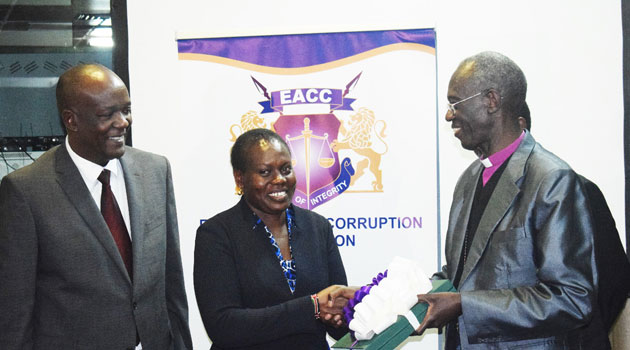
Speaking at the launch of a systems audit of the Ministry of Lands on Wednesday, EACC Chairperson Archbishop (Rtd) Eliud Wabukala said clarity of roles between county land agencies, the National Land Commission (NLC), and the lands ministry had opened up loopholes for corruption to thrive/MOSES MUOKI
NAIROBI, Kenya, Mar 14 – The Ethics and Anti-Corruption Commission (EACC) has recommended the formulation of land policies in sync with the Constitution (2010) in order to address land mismanagement and dismantle land cartels.
Speaking at the launch of a systems audit of the Ministry of Lands on Wednesday, EACC Chairperson Archbishop (Rtd) Eliud Wabukala said clarity of roles between county land agencies, the National Land Commission (NLC), and the lands ministry had opened up loopholes for corruption to thrive.
“We should encourage ministries and state departments to take a personal lead in preventing corruption at their door-steps,” the retired head of the Anglican Church of Kenya said.
“It is possible to create a culture of integrity in ministries and state departments which then becomes a tool for fighting corruption,” Wabukala added.
The EACC report which examined systems, policies, procedures, and practices of the lands ministry, identified glaring weaknesses in land management both at the national and county government level which land cartels continued to exploit to seize landed properties and encroach on reserves.
For instance duplication of roles of national and county government planners was cited as a cause for lack of accountability which creates opportunities for bribery and extortion.
“In Uasin Gishu and Nakuru counties, the Ministry Regional Coordinators were doubling as County Government Physical Planners,” the report indicates.
“A Senior Physical Planner with the Ministry of Lands in Nakuru County was signing certificates of compliance as the Director of Physical Planning which is a prerogative of the County Government,” another instance is cited in the report.
The report recommends rationalization of physical planning staff based on provisions of the County Government Act (2012) to resolve the problem of dual roles.
The non-existence of urban and city boards in conformity to the Urban Areas and Cities Act (2011) was also identified as a grey area in land management.
According to the report, the non-availability of the boards had given rise to haphazard developments which have led to congestion and obstruction in town and city centers.
Lands Cabinet Secretary Farida Karoney who agreed with the findings of the report assured of her ministry’s commitment to strengthen internal management systems to address gaps fueling land fraud.
“We need to refine our people systems because no change is possible if the people systems are weak,” she said.
As a mitigating measure, the former media executive said her ministry will work with other government agencies to secure physical land records even as efforts are intensified to have all land records digitized.
“If a file is moving from the ministry to the lands commission or is being locked in someone’s draw at the ministry, we cannot reform,” she pointed out.
“That is why digitization is a strategic priority. Someone should be able to access their land records from their houses without having to follow our staff to access our records,” she added.
Karoney was accompanied by the ministry’s Chief Administrative Secretary Gideon Mung’aro and Nicholas Muraguri, Principal Secretary in the State Department of Lands.









































